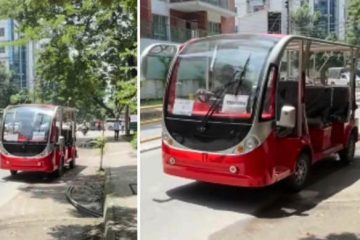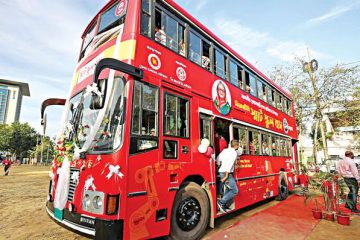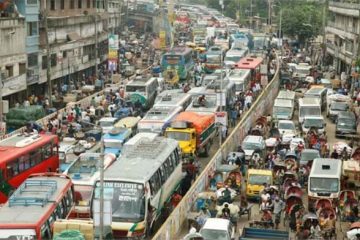Drive against hanging cables begins as timeline for going underground expires
 A government crackdown begins today on all overhead Internet and cable TV wires on thoroughfares between Uttara and Shahbagh in the capital, with the likely disruption of the services in the next seven days and making them even costlier.
A government crackdown begins today on all overhead Internet and cable TV wires on thoroughfares between Uttara and Shahbagh in the capital, with the likely disruption of the services in the next seven days and making them even costlier.
Starting from Karwan Bazar area of the capital, the removal of the wires, hanging from utility poles, would continue over the next few days during which Internet users might experience interruptions, Internet Service Providers Association of Bangladesh (ISPAB) said yesterday.
They said after they move to the underground network they will have to charge 15-20 percent more for their services to compensate or the extra costs.
“Removing all the cables and taking the cable service underground may take well over a year,” said Anwar Parvez, former president of Cable Operators Association Bangladesh (Coab), “As far as I know, not even five percent of the 600 cable operators have moved their cables underground.”
The association claimed cable operators contribute very little to the mess of wires.
Parvez blamed technical limitations with the underground fibre network for the delay. “It will hamper the quality of our service and increase charges as well,” he said.
Officials of Dhaka Electric Supply Company and Dhaka Power Distribution Company (DPDC) will start the drive at Karwan Bazar in presence of Power Secretary Mohammad Abul Kalam Azad, representatives from several ISPs and cable operators.
“There will be some formalities [inauguration]. And then we will remove cables from Karwan Bazar and some adjacent areas,” said ASM Siraj Ullah, director (Engineering) of DPDC.
The two authorities, responsible for managing the utility poles in the city, had issued a number of notices asking the cable operators and Internet service providers in its jurisdiction to remove wires hanging from poles.
An underground optical fibre network, a subterranean duct to house the cables, is already in place and waiting for the cable operators and ISPs to get connected, power distribution officials said.
“The deadline for them to move their cables underground has already been extended three times over the last few months. But this is the end of the line,” said Siraj Ullah.
The last deadline expired on November 30.
The initiative aims to free Dhaka’s landscape from the “unsightly” mess of overhead cables, power distribution officials said.
Apart from being an eyesore, the haphazard installation of cables puts pressure on the electricity poles inviting possible accidents and much inconvenience, they added.
“The drive will continue until all the illegal overhead cables from Uttara to Shahbagh via Jahangir Gate are removed out of sight,” said Siraj.
“Maybe it will create public sufferings,” he said, adding that unless strong steps are taken now the cable mongers will keep on dillydallying.
Cable Operators Association of Bangladesh (Coab) members called the drive symbolic and hoped that the “drive is to scare the operators” so that they remove their cables soon.
“If they bring down the cables, the biggest sufferers of the move will be the people who would not receive cable television feeds or Internet services,” said Anwar Parvez.
Leaders of ISPAB during a press conference at a city hotel yesterday said they would increase Internet service charges by 15-20 percent after switching to the underground cable network.
“We will have to pay additional charge for the new network. The government will not subsidise us. So we have no alternative to increasing Internet service charge,” said ISPAB president Akhtaruzzaman Manju.
They also demanded reduction of 15 percent VAT on providing Internet service and compensation for the overhead cables that will be useless after the switch.
“During the removal process, Internet connections of many large government and private institutions may get stalled for an indefinite period,” said the representatives of ISPAB at a press conference, adding, “We apologise for the inconvenience.”
“We have already moved our PoPs [point of presence] on major lines from Uttara to Shahbagh area of the capital but at access level many cables still remained on the main road due to shortage of time,” said Akhtaruzzaman.
“At the same time, this is unclear what would happen to the redundant links and if there is a problem in the underground network,” he added.
The burying of overhead cables has been debated in the telecommunications circle in recent months, with the ISPs and cable TV operators repeatedly asking to extend the government-fixed deadline.
“The city corporation should take the responsibility of building and maintaining underground infrastructure as soon as possible,” Manju said.
“At the same time, at least six months time should be given for removing overhead cables in the next phases,” he said.
According to the Fibre @ Home Ltd, one of the two nationwide telecommunication transmission network (NTTN) companies that are responsible for building and managing the underground network, it has so far connected 55 ISPs and six cable operators with their underground cable in the city.
Summit Communications, the other NTTN, has completed setting up underground cable network of 18 ISPs.
Fibre @ Home Managing Director Moynul Hoque Siddique told The Daily Star that they would receive a monthly charge of Tk 3 from each ISP and Tk 0.5 from each cable operator for each metre of the cable they use. This is in addition to the charge for the use of bandwidth of the underground cable.
Fibre @ Home Ltd has installed a 300-kilometre-long transmission network in the city and 1,200 kilometres across the country covering 23 districts and 90 upazilas, said Moynul.
An official of the firm said ISPs’ cost of operation would not increase after the switch since they would have a large chunk of their overhead network maintenance cost to spare.

















